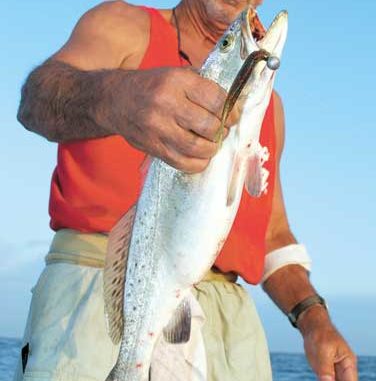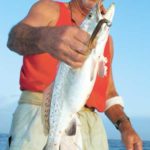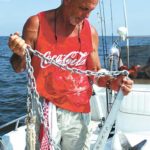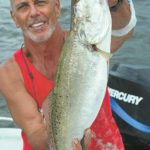
There’s nothing artificial about the hot action you’ll enjoy this month at Lake Pontchartrain’s newest fishing sites.
The gaudy neon lights of the Treasure Chest Casino dominated the pre-dawn darkness at the Williams Boulevard Boat Launch in Kenner. Except at the casino, absolutely nothing moved in the oppressively humid night air that wafted in from Lake Pontchartrain.
After he launched his 24-foot bay boat, 62-year old Tony Cash idled the craft out of the harbor and into the open lake. Only when well clear of the harbor did he step up the boat on plane. As he coasted northeast, a hazy halo of light hung over New Orleans, pierced by the tall office buildings of the Central Business District.
Daylight crept in from the east, infusing a mauve, almost bruised purple, hue into the sky. Further to the east, the twinkle of headlights from commuters’ vehicles streaming into the city from their northshore suburban havens became visible on the Causeway.
Cash’s eyes didn’t dwell on the beauty of the morning. They were mostly directed toward his GPS screen. His destination was one of the big lake’s three artificial reefs located in Jefferson Parish waters. His depth sounder indicated a steady 14 feet of water beneath the boat.
Nearing his first planned stop, he slowed to an idle, and the depth sounder soon showed the bottom rising from 14 feet to 10 feet. He was over the reef. No other boats were in sight.
After bringing the boat to a stop, Cash stepped to the bow and picked up an extravagantly large claw anchor that he had chained and roped at each end.
“It’s very difficult to anchor in Reef Balls,” he explained with a grunt as he heaved the 22-pound monster. “When I used a regular anchor, I had horrendous problems, both with the anchor slipping and, when it did bite, with getting it back.”
Having to re-anchor is not just a nuisance when fishing the lake’s artificial reefs — it’s a courtesy issue. All of the artificial reefs in the lake are small, and boats slipping out of position can bump into other boats or drift into their fishing spots.
“If everyone anchors properly, only three boats, at best, can fish on any one of the three artificial reef sites in Jefferson Parish,” he said.
As he rigged his rods, increasing daylight revealed a slender, white-haired, heavily tanned and tautly muscled man. With his closely cropped white beard and angular features, his visage resembled nothing so much as a marble bust of a Roman emperor.
His left forearm was tightly banded.
“Tennis elbow,” he explained. “We’ve really been on them this year,” he said with a grin.
Alternately using both baitcasting and spinning rods, he started tossing soft-plastic lures, either Deadly Dudley Jr. straight tails or DOAs. His favorite colors, by far, are avocado and motor oil, but he added that on occasion he will use chartreuse, blue moon or opening night.
Cash is an experienced live-bait fisherman, but he has not had to use it while fishing on reef balls since he started fishing in the lake after retiring as sales manager for Coca Cola Enterprises in 2008.
“Live bait attracts so many other predators, especially croakers,” he explained.
After he boxed his first speckled trout of the day, a plump 14-incher, he noted humorously that while he has lived within a half mile of the Williams Boulevard Boat Launch for many years, he spent his last 20 years of what he calls “serious” trout fishing pounding the waters of Delacroix, Pointe a la Hache and Cocodrie.
“Larry Moskau made me come out here,” he said. “He’s one of the best lake fishermen I know. I will put him up against anyone. It was great to find this just a half mile from home. I’m like a kid with a new toy.”
Cash loses a lot of baits to the reef balls. The very thing that makes the balls attractive to fish, their intricate structure, makes them gobble lures by the handfuls. He says it’s easy for a fisherman to lose as many as 15 lures in a trip.
But Cash was catching trout, and some were nice trout, ranging from well over 2 pounds up to 4 pounds. The bite was subtle, and most fish were lip-hooked, but he disdains using a net, except for the largest fish, so he lost a lot of fish when he tried to flip them in the boat.
A good thing about the lake, he says, is that while fish size fluctuates here like anywhere, Lake Pontchartrain trout definitely average larger than trout in most other areas. Plus trout from the lake have a lot fewer worms in their flesh than those from some other areas.
Cash says speckled trout in Lake Pontchartrain bite very subtly most of the time.
But not always.
“Oh jeezum, that one almost took the rod out of my hands,” he grimaced after missing one.
Cash was fun to fish with, and kept up a constant patois as he fished. He has an expressive face, and sometimes his grimaces are comical.
Most of the time, though, he was in concentration, feeling for the tiniest indication that a fish had picked up his lure. He slowly and methodically waved his rod with his left hand during the retrieve in a graceful, almost tai chi motion.
A lot of the bites seemed to come at the end of his rod’s sweep, when he had no more room to strike to set the hook. When this happened, he ran across the 8 1/2-foot stern of his boat to set the hook. Sometimes he missed the strike and, with no resistance, teetered off balance, seemingly ready to crate into the bottom of the boat. But like an acrobat, he recovered each time and kept fishing.
His retrieve over and through the Reef Balls could only be called slow drags, which he accomplished with the tai chi wave. Cash never bounced the jig back to him, picking up slack between bounces.
“I am a high-energy kind of guy, so it was hard for me to learn to slow down to fish in this lake,” he said. “It takes a lot of patience to fish reef balls.”
Because of the generally light bite of these fish, Cash spools both his casting and spinning reels with 30-pound-test braided Power Pro line, which he feels increases sensitivity.
“But I use 15 to 18 inches of 20- to 30-pound-test mono leaders,” he said. “You hang up too much here, and you would never be able break the braided line to get loose.
“Ugrrh, oh man, they are here right now, Bubba,” he uttered as a silvery fish soared through the air into the boat.
A lot of white trout were mixed with the specks, some of them of respectable size, but they were beneath his attention and all were returned to the water.
Every hit and especially every miss drew a reaction.
“Got one, ough, he got off. Look at that — I had three nice fish bite on that cast. You son-of-a-gun! There we go; they are right there.”
Finally, as if he hadn’t caught a fish all day, he pled as if in prayer: “Oh help me get this one in.”
As he fished, he explained that these reefs aren’t the only places in Lake Pontchartrain to hold trout. The bridges hold fish, as do the few oil and gas structures and pilings. Some fish are caught along shorelines as well.
“I absolutely think that there is a shortage of structure in the lake,” he said. “The few things that we do have really hold fish though.
“They can’t build enough artificial reefs in this lake. The more they build, the better the lake will become. It could be a world-class fishery. Can you imagine what it would be like with 30 or even 40 of these sprinkled around the lake?”
Then Cash returned to a topic of great interest to him, courtesy between fishermen.
“If someone is on a reef, give them enough room to cast 360 degrees around their boat,” he said. “These fish circle round and round on these reefs. You have to be able to follow them from your boat.
“Just because someone is fishing off the stern of their boat when you pull up means nothing. In 10 minutes, they will be fishing off the bow. You also hurt yourself by pulling too close to another boat. You cut yourself off.”
As if on cue, to demonstrate Cash’s concern, another boat with three anglers approached. They steered tight circles within casting distance completely around his boat, then dropped their anchor. Their boat drifted back to sit over the exact spot that he had been casting into.
“That kills me,” he said, chopping the air for emphasis. “That happens all the time out here.”
Of course, their anchor doesn’t hold, so they had to pick it up, restart their motor, run back through the spot Cash was working and then throw the anchor again.
Cash left.
First and second stop were at oil and gas structures located west of the Causeway.
Nothing. Nada.
The next artificial reef yielded nary a bite as well. But on the third one, Cash began picking up trout again.
The weather was unsettled, however. A brisk wind was blowing from the southeast. Even though it was barely mid-morning, a squall was building to the northwest.
Holding his eyes wide for added emphasis, Cash cautioned that anglers fishing in the huge lake should always be watching the weather, especially in late summer when violent squalls are most apt to build.
Fishermen launching on the south shore should be especially alert to squalls building to the south of them, he said. Such a thunderstorm, moving to the north, could rapidly cut anglers off from safe port. And the big lake gets ugly fast.
This squall was building fast, but Cash was near his 25-fish limit, plus he really wanted to catch at least one speckled trout over 5 pounds, something he has done regularly this year.
Finally, with one eye on the storm, he said, “One more cast.”
Almost as if it were scripted, Cash struck, but the fish struck back. The big trout bore deeply, and ran under the boat, dragging the tip of the 6 1/2-foot rod with it. Cash crouched and leaned on the rod trying to dig the fish out from beneath the boat.
“Get the net,” he calmly ordered. “This is one to take a picture of.”
One scoop, and the 25-inch-plus, 6-pound beast was on board. After throwing a wary glance at the approaching storm, Cash posed for a few pictures, then weighed anchor for the run to the landing.
On the way in, the happy man leaned over and said, “When you feel those big boys, there is no give. You know he’s good. You hit them, and they hit back.
“When I was a kid, my grandmother Rosa Vitrano had a seafood stand in the Rocheblave Market. I loved being there. I got hooked on being around fish and seafood. They had to drag me out of there.
“I still like being around fish. I like to fish. I like to feel that thump.”






